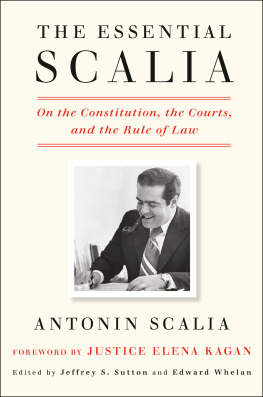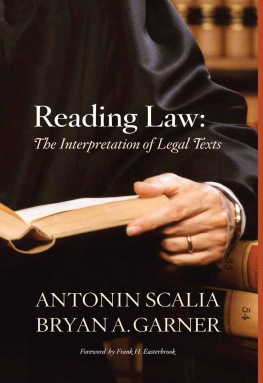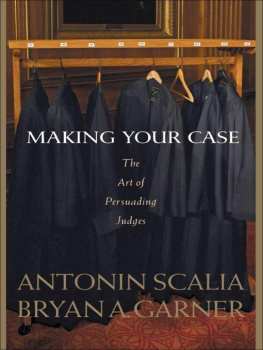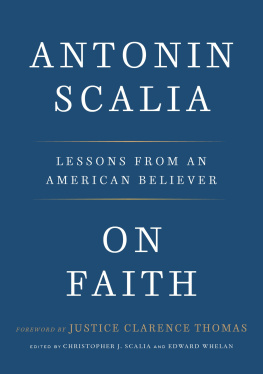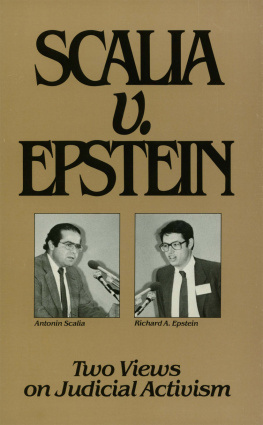Antonin Scalia - The essential Scalia: On the Constitution, the Courts, and the Rule of Law
Here you can read online Antonin Scalia - The essential Scalia: On the Constitution, the Courts, and the Rule of Law full text of the book (entire story) in english for free. Download pdf and epub, get meaning, cover and reviews about this ebook. year: 2020, publisher: The Crown Publishing Group, genre: Romance novel. Description of the work, (preface) as well as reviews are available. Best literature library LitArk.com created for fans of good reading and offers a wide selection of genres:
Romance novel
Science fiction
Adventure
Detective
Science
History
Home and family
Prose
Art
Politics
Computer
Non-fiction
Religion
Business
Children
Humor
Choose a favorite category and find really read worthwhile books. Enjoy immersion in the world of imagination, feel the emotions of the characters or learn something new for yourself, make an fascinating discovery.
- Book:The essential Scalia: On the Constitution, the Courts, and the Rule of Law
- Author:
- Publisher:The Crown Publishing Group
- Genre:
- Year:2020
- Rating:4 / 5
- Favourites:Add to favourites
- Your mark:
- 80
- 1
- 2
- 3
- 4
- 5
The essential Scalia: On the Constitution, the Courts, and the Rule of Law: summary, description and annotation
We offer to read an annotation, description, summary or preface (depends on what the author of the book "The essential Scalia: On the Constitution, the Courts, and the Rule of Law" wrote himself). If you haven't found the necessary information about the book — write in the comments, we will try to find it.
The essential Scalia: On the Constitution, the Courts, and the Rule of Law — read online for free the complete book (whole text) full work
Below is the text of the book, divided by pages. System saving the place of the last page read, allows you to conveniently read the book "The essential Scalia: On the Constitution, the Courts, and the Rule of Law" online for free, without having to search again every time where you left off. Put a bookmark, and you can go to the page where you finished reading at any time.
Font size:
Interval:
Bookmark:
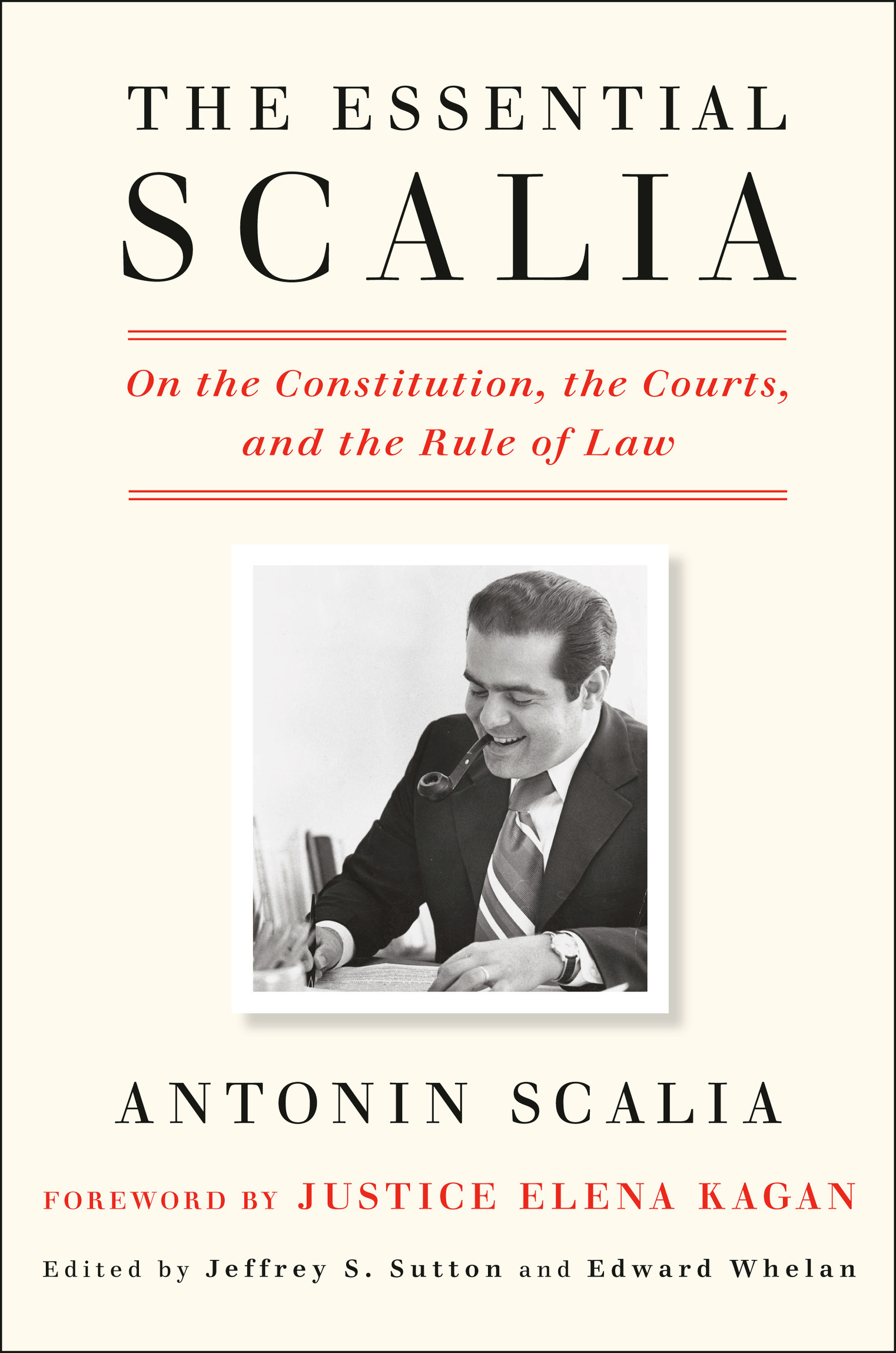
The Essential Scalia: On the Constitution, the Courts, and the Rule of Law
On Faith: Lessons from an American Believer
Scalia Speaks: Reflections on Law, Faith, and Life Well Lived
A Matter of Interpretation: Federal Courts and the Law
Reading Law: The Interpretation of Legal Texts (with Bryan A. Garner)
Making Your Case: The Art of Persuading Judges (with Bryan A. Garner)
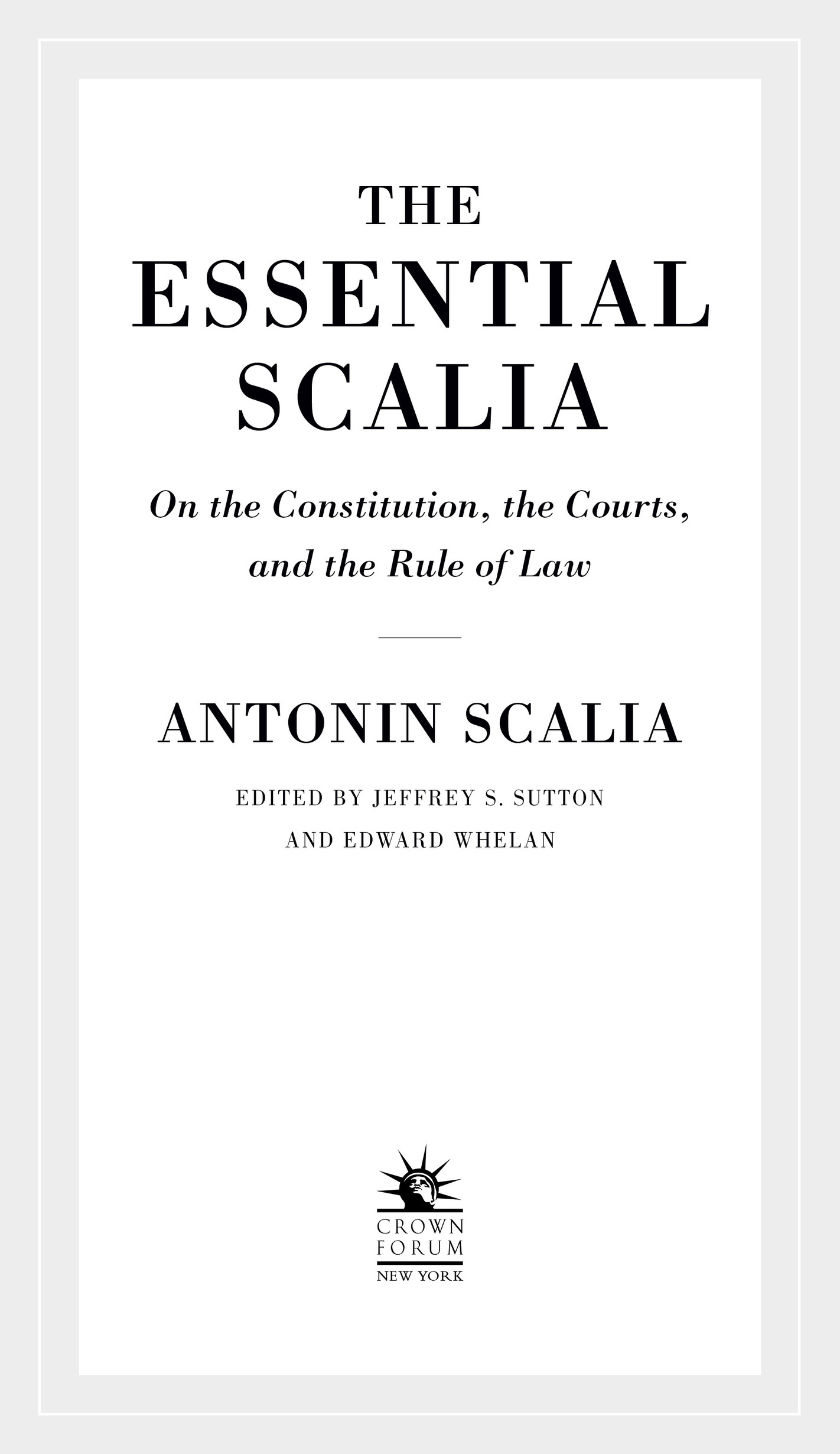
Copyright 2020 by Maureen Scalia
Foreword copyright 2020 by Elena Kagan
All rights reserved.
Published in the United States by Crown Forum, an imprint of Random House, a division of Penguin Random House LLC, New York.
C ROWN F ORUM with colophon is a registered trademark of Penguin Random House LLC.
LIBRARY OF CONGRESS CATALOGING-IN-PUBLICATION DATA
Names: Scalia, Antonin, author. | Sutton, Jeffrey S. (Jeffrey Stuart), 1960 editor. | Whelan, Edward, 1960 editor.
Title: The essential Scalia / Antonin Scalia ; edited by Jeffrey S. Sutton and Edward Whelan.
Description: New York : Crown Forum, 2020. | Includes index. | Identifiers: LCCN 2020007842 (print) | LCCN 2020007843 (ebook) | ISBN 9781984824103 (hardcover) | ISBN 9781984824110 (ebook)
Subjects: LCSH: Judicial opinionsUnited States. | LawUnited StatesCases. | LCGFT: Court decisions and opinions.
Classification: LCC KF213.S32 S33 2020 (print) | LCC KF213.S32 (ebook) | DDC 347.73/2634dc23
LC record available at https://lccn.loc.gov/2020007842
LC ebook record available at https://lccn.loc.gov/2020007843
Ebook ISBN9781984824110
randomhousebooks.com
Book design by Victoria Wong, adapted for ebook
Cover design: Joseph Perez
Cover photograph: Clay T. Whitehead Collection
ep+_prh_5.6.0_c0_r0
And when the last law was downand the Devil turned round on youwhere would you hide, Roper, the laws all being flat? This countrys planted thick with laws from coast to coastMans laws, not Godsand if you cut them downdyou really think you could stand upright in the winds that would blow then?
St. Thomas More to his son-in-law William Roper, in Robert Bolts A Man for All Seasons
In the six years Nino and I served together on the Supreme Court, I held to an unwavering rule. When Nino circulated a new opinion, I would put aside whatever else I was doing to read it. Whether I expected to agree or to disagree, I wanted to know immediatelynot in a day or in an hour but right nowwhat Nino had to say. I wanted to dive into his inimitable writing style. To marvel at the power of his mind. And most important, to take the measure of his ideas.
I envy the reader who has picked up this book, as I once picked up those opinions, not knowing what he or she will find. Dont get me wrong: Justice Scalias writings on the law wear well. They bear re-reading and re-reading again. (As a former law professor, I read some of them a dozen times or more, and kept seeing or learning something new.) But in these last few years, I have missed the enjoyment and excitementeven the exasperationthat came from thinking about Ninos latest opinion. I doubt that anyone who turns the final page of this book will wonder why.
No one has ever written quite like Nino, and no one ever will. He was a master of the aphorism, the analogy, the metaphor, the aside. His prose was simply ingeniousclever and pungent, pithy and sharp, plainspoken yet utterly original. Judge Sutton (no mean stylist himself) gives some of the best-known examples in his introduction: the test that asked judges to figure out whether a particular line is longer than a particular rock is heavy; the problem with legislation creating a sort of junior-varsity Congress; the interpretive rule that Congress doesnt hide elephants in mouseholes. And there are plenty more. The oft-interred doctrine that like some ghoul in a late-night horror movierepeatedly sits up in its grave and shuffles abroad. The First Amendments prohibition of a statute that license[d] one side of a debate to fight freestyle, while requiring the other to follow Marquis of Queensberry rules. Maybe most famous of all, the counterpoint to the kind of constitutional peril that comes cladin sheeps clothing: But this wolf comes as a wolf. Line after line, it is captivating stuff, full of wit, dash, and verve.
But the style was not for the sake of style: it was always in the service of ideas. Nino loved ideasthinking about them, talking about them, arguing about them, as well as writing about them. That love may explain why he found it so natural to befriend colleagues with whom he often disagreed (yes, like me). Echo chambers, I suspect, bored him; it was difference of opinion that enlivened conversation, sparked debate, and created opportunities for learning. His love of intellectual exchange similarly accounts for his preeminent role in the Courts oral arguments. When I was solicitor general, I half dreaded, half hoped for questions from Justice Scalia. They were as hard as questions come, but also direct and fairdesigned not to trip me up, but simply to confront me with whatever was the principal weakness in my position. And for the most part, they really were questions: Justice Scalia let me respond in full and listened attentively to what I said. Once, when he had asked me a series of impossible questions, I asked him one back. A bad call: the Chief Justice rightly stepped in to remind me that lawyers dont get to put Supreme Court justices on the spot. But absent that intervention, Im confident Justice Scalia would have answered the question (which was probably why I presumed to ask it)decorum thus giving way to substantive debate. And of course, that same kind of give-and-take could occur on the page. For all Ninos stylistic flair, the real strength of his writingespecially when he concurred or dissentedlay in its passionate yet disciplined engagement with ideas. Look for it throughout this volume: in sentence after sentence, paragraph after paragraph, Nino laid outcogently, logically, with analytic rigor and precision, and at times with the elegance of a mathematical proofdeep and provocative understandings of the way the law should work. (Read Mistretta; read Morrison; read R.A.V. I may or may not agree. Butwow.) Its possible that Nino wrote so well because he thought so well. And even if not, the main thing is the thought, memorable and lasting.
I often ask myself how Nino would have reasoned through some legal problem. That exercise sometimes persuades me to come out the same way; over the years, Nino convinced me of things I didnt first think (see, for example, Johnson), as I also did him (not mine to reveal). But the Nino test makes my work better even whenor especially whenI wind up disagreeing. I discovered this effect early on, in my very first opinion. The Courts tradition is that a justices maiden majority be unanimous. But Nino thought that silly: what was the point, he asked me (as he pretended to seek my permission for his solo dissent), of a convention that shied away from, rather than delighted in, the clash of ideas? So I was forced to respond to Ninos incisive views on the car-ownership deduction in bankruptcy law and, in that way, to make my own argument tighter and more convincing. From that day to this one, I have written many of my opinions while imagining a miniature Nino sitting on my right shoulder. That Nino has never gotten me to pull my punches. To the contrary, hes led me (as the real Nino would have liked) to work harder and dig deeper, to search for the arguments that can withstand his mighty ripostes, to plug every hole in my analysis that he so gleefully finds. Nino has upped my game as a judge. And Ill dare to speak for my colleagues by saying that Ninos peculiarly trenchant form of legal argument has done the same for the whole Court. Even after his death, it rings in our ears.
Font size:
Interval:
Bookmark:
Similar books «The essential Scalia: On the Constitution, the Courts, and the Rule of Law»
Look at similar books to The essential Scalia: On the Constitution, the Courts, and the Rule of Law. We have selected literature similar in name and meaning in the hope of providing readers with more options to find new, interesting, not yet read works.
Discussion, reviews of the book The essential Scalia: On the Constitution, the Courts, and the Rule of Law and just readers' own opinions. Leave your comments, write what you think about the work, its meaning or the main characters. Specify what exactly you liked and what you didn't like, and why you think so.

